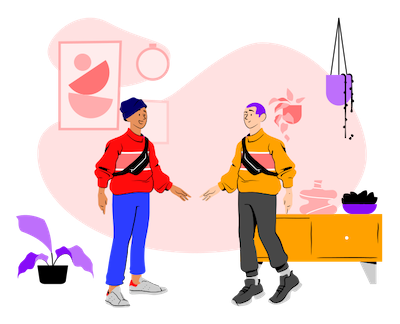|  | | | Bonjour et bienvenue, aspiring French learner! In this edition, we'll explore fascinating words like 'américain', 'animal', 'connaissance', 'île', and 'chance', along with the insightful proverb - 'Rome ne s'est pas faite en un jour'. |
| |
| |
|
|
américain The French word for 'American' is 'américain'. It is an adjective and could be used to describe someone's nationality, a product or anything else that is from or related to America. Like all French adjectives, remember that 'américain' will need to agree in gender and number with the noun that it is modifying, resulting in four possible forms: américain, américaine, américains and américaines. Here's how to use it: Il a un accent américain distinct. De nombreux films américains sont populaires dans le monde entier. Nous avons embauché un professeur d'anglais américain pour améliorer notre accent.
| |
|
animal The French word for animal is 'animal'. It is used in the same context as in English to refer to any member of the Animalia kingdom, including humans. It can be used to describe pets, wildlife, and zoo inhabitants. It can also be an adjective describing anything relating to animals. Here's how to use it: Chaque animal a son propre habitat. Cet animal est en voie de disparition. L'homme est un animal social.
| |
|
connaissance 'Connaissance' is used to describe someone you know but not close enough to call a 'friend'. It's the French equivalent of the English 'acquaintance'. Here's how to use it: Votre connaissance du cinéma est impressionnante. Elle a une connaissance approfondie des films d'horreur. La connaissance des films classiques est indispensable pour tout cinéphile.
| |
|
île The French word for 'island' is 'île'. It is used much the same as the English term, referring to a piece of land surrounded by water. It can be used in various contexts such as geography, travel, and description of places. For example, 'Je vis sur une île' and 'Cette île est belle' meaning 'I live on an island' and 'This island is beautiful' respectively. Here's how to use it: Le trésor est caché sur l'île. L'île est accessible uniquement par bateau. Je me sens seul sur cette île déserte.
| |
|
chance In French, 'chance' has a similar meaning to its English translation, often referring to luck or fortune. It can be used in a variety of contexts, though, such as in the phrase 'Bonne chance!' which means 'Good luck!' It's also used in certain expressions like 'par chance' meaning 'fortunately' or 'by chance.' Here's how to use it: | |
|
🤔🤔🤔 Rome wasn't built in a day | |
|
| Never stop learning, Mike from LangBites PS 👉 Answer a 3 question survey to help me improve this service ☺️ | |
|
| You received this email because you signed up at LangBites.co. Click here to unsubscribe. |
| |
|
|
|

